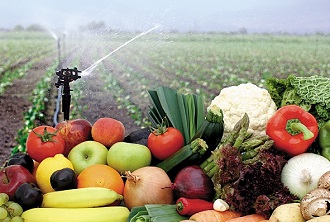Why Study this Commercial Vegetable Production Course?
If you want to produce vegetable commercially, search no more! This is exactly the course you are looking for! This online commercial vegetable production course will help you gain skills and knowledge to start a farming enterprise, such as the cultural practices for vegetable production, the way to manage pests, diseases and weeds, choosing the suitable vegetable to grow, how to achieve a plant’s optimum growth, how to treat plants during and after harvest, and the marketing strategies used.
Online Course Commercial Vegetable Growing
Develop skills and knowledge required for commercial vegetable production, including a variety of production methods. This is a very sound 100 hour foundation course in general vegetable production.
- Study commercial vegetable production for improved crops and job prospects.
- Study in your own time and at your own pace.
- Understand production methods for vegetable production.
- Learn from experienced tutors
Note: This is not Organic Vegetable Growing.
Course Aims
- Select appropriate vegetable varieties for different situations.
- Explain general cultural practices used for vegetable production.
- Explain the management of potential problems, including pests, diseases, weeds, and environmental disorders, in vegetable production.
- Explain alternative cultural techniques, including greenhouse and hydroponic production, for vegetables.
- Determine specific cultural practices for selected vegetable varieties.
- Determine the harvesting, and post-harvest treatment of different vegetables.
- Develop marketing strategies for different vegetables.
Course Outline
There are 8 lessons in this course:
- Introduction to Vegetable Growing
- Making the farm Pay
- Understanding economic principles – supply and demand, scale of economy, etc.
- Planning for the farm
- Production planning
- Financial planning and management
- Land care and land management
- Marketing
- Personal welfare
- Risk management – spreading risk, quality management, contingency planning, liquidity
- Creating a sustainable farm enterprise
- Planning for sustainability
- Planning for drought
- Crop selection
- Monocultures
- Alternating crops, broad acre or row crops
- Growing Brassicas -Cabbage, Cauliflower, Brussel Sprouts, Pak Choi, Broccoli, Radish, Turnip
- Growing Legumes -Beans, Broad Beans, Peas
- Growing Lettuce, Onions, Potatoes
- Cultural Practices for Vegetables
- Explain general cultural practices used for vegetable production.
- Crop rotation
- Soils
- Plant foods
- Cover Crops
- Legumes and inoculation
- Growing various cover crops -Barley, Buckwheat, Canola, Lucerne, Field pea, Lupins, Oats, Sorgham, Clover, etc.
- Ways of using a cover crop
- Cultivation techniques
- Compost
- Crop Scheduling
- Planting Vegetables -seed, hybrid seed, storing seed, sowing seed
- Understanding Soils
- Dealing with Soil Problems
- Plant nutrition and feeding
- Pest, Disease & Weed Control
- Weed control -hand weeding, mechanical, chemical and biological weed control methods
- Integrated Pest Management
- Non chemical pest control
- Understanding Pesticide labels
- Understanding the law in relation to agricultural chemicals
- Plant Pathology introduction
- Understanding Fungi
- Understanding insects, virus and other pathogens
- Insect control -quarantine, clean far5ming, chemicals, biological controls
- Review of common diseases
- Review common pests
- Review common environmental problems
- Review common weeds
- Hydroponic and Greenhouse Growing
- Introduction to hydroponics
- Types of systems
- Nutrient solutions
- NFT and other systems for vegetable production
- Growing in a greenhouse (in the ground or hydroponics)
- Components of a Greenhouse System
- Types of Greenhouses and common greenhouse designs (venlo, mansard, wide span, multi span, poly tunnel, Sawtooth, Retractable roof, etc)
- Shade houses, Cold Frames
- Environmental Control -heating, ventilation, lighting, etc
- Controlling moisture (misting, fog, etc)
- Review of various vegetables – Cucurbits (Cucumber, Melon, Pumpkin, Watermelon, Zucchini)
- Growing Selected Vegetable Varieties
- Determine specific cultural practices for selected vegetable varieties.
- Tropical Vegetables – Sweet Potato and Taro
- Less common vegetables – Globe Artichoke, Jerusalem Artichoke, Asparagus, Chicory, Endive, Garlic, Leek, Okra, Rhubarb
- Other Crops -Beetroot (Red Beet), Capsicum, Carrot, Celery, Sweet Corn, Eggplant, Parsnip, Spinach
- Irrigation
- Water and Irrigation
- Infiltration
- Internal Drainage
- Flood, Sprinkler and Trickle irrigation
- The objective of irrigation
- Transpiration and Wilting Point
- When to irrigate Timing irrigations
- Detecting water deficiency or excess
- Understanding soil moisture
- Pumps, sprinklers and other equipment
- Water hammer
- Improving Drainage
- Managing erosion
- Harvest & Post-Harvest
- Introduction to harvesting
- Post harvest treatment of vegetables
- Cooling harvested produce
- Harvesting tips
- Storing vegetables
- Marketing Vegetables
- Introduction
- Standards for cost efficiency, quality and quantity
- Options for Marketing Produce
- Market Research
- How to sell successfully
Enrol Now
- Experienced Tutor support
- Certificate sent to you
- Online study (Printed notes available)
- Self paced - no set timetable
- 12 months to complete course
From: $35.00 / week for 19 weeks
Get a Free Info Pack!











